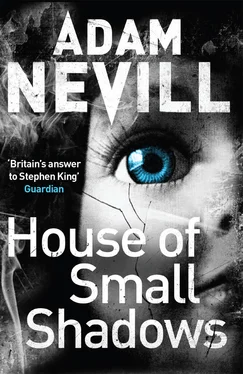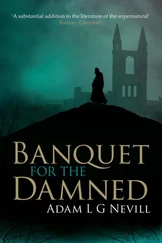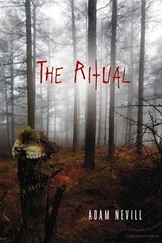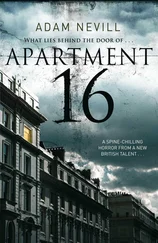In the same spirit of her tour of the dismal village, communication with the only inhabitant she’d found was futile. But there was a surety and earnestness in the voice that made her linger. Catherine sensed this person believed that she was entirely aware of a set of facts upon which the speaker wanted a conversation to be based. Only she wasn’t aware of these facts, but to walk away would be rude. ‘Sorry. I don’t understand. I don’t think I can help.’
‘Here, here. Yous’ll want this. Run down that shop and get us half a pound of it.’ A thin arm came around the edge of the door. Some way above the limb, what looked like artificial greyish hair indicated the position of the mostly hidden head. But the person must have been small as the tuft of hair was no higher than her own shoulders and the threshold of the house was raised one step off street level.
Catherine recoiled from the arm, tightly clad in dusty black cloth that ended in a small and bloodless hand. There was no glove. The skin was papery and almost transparent, the nails yellow and uncut. The woman must have been elderly, perhaps mentally ill, terribly neglected, and had mistaken her for some fragment from her failing memory. If offering money had been the aim, the proffered fingers were empty.
‘The shop is closed. I thought the village was empty.’
‘Half a pound, and some of them biscuits he does.’
She wondered if there were neighbours or relatives she could call for the woman. ‘Sorry. I said it’s closed. The shop. Everything. Here. It’s all closed. Can I help you? Get someone?’
‘Ain’t seen her since she went up that house, is all. Going all black over them roofs now, dunnit eh? Still some turning to go. Turning, arr, afore the sliding in and the sliding out.’
Catherine walked away without another word.
The door never closed on the disappointed silence that seemed to swell behind her. In the empty store across the road, she was half aware of someone waving to her from deep inside the building behind the dirty glass. The arm appeared too thin, but that effect must have been caused by the angle at which she moved to ignore the motion, combined with the dim light.
She kept on walking, but more quickly now.
Even when in sight of the Red House’s chimneys, the dreary and abandoned spirit of the village still discoloured her thoughts. Turned them into an old photograph, dour and brown with age, corrupted by blemishes.
Maybe this great house, this mausoleum that honoured loss and madness, had drawn all the colour, light and life out of the village. Bled its vitality up the lane years ago, to this dreadful edifice. Itself erected on ground verdant with meadows, briars, thorns, and tough grasses, as if the land was also returned to some former time that no hedgerow or wall could restrain. All around the Red House was forgotten, untended, and left to grow wild, while the building remained perfectly preserved.
Catherine patted down her damp and clinging dress. The cloudburst had been short, but ferocious enough to soak her to her underwear. She hurried through the hawthorn tunnel and returned to sunlight to continue drying out.
The front door was open as she had left it, the house silent, the grounds wet and sparkling as they dried. She checked her watch. Edith would be sleeping. Maude in her scullery, washing the dishes from the luncheon she’d missed.
But before she went inside, she wanted to inspect the garden to discover what it was the bee-keeper had been doing beneath her window. She desperately wanted something to start making sense around here, and had a savage impulse to smack her own face until reason returned and stayed put.
Guests still had rights and she was done with being kept in the dark, and distracted, manipulated. Mike, Tara, Edith, Maude, they were all taking and taking and taking something from her. Even if they were not present, their bullying influences were. Here, at best, she was being humoured, but also deceived. She’d tried to loosen the noose, but the village thwarted her.
It was irrational to think this.
Why did she allow people to affect her so much?
Beside the porch she found vestiges of a path made from greening flagstones that hugged the foundations of the building. Catherine followed the path, often untangling the hem of her skirt from the prickly things with rhubarb-red stalks that intruded upon the narrow space between the house’s walls and the garden’s overrun borders.
Her progress along the side of the house was enclosed by shadow, and slow, and impeded by great rose stems that adhered to the bricks like tropical vines. She grazed her bare legs, cut the back of one hand. The abrasions stung and her skin itched.
When she rounded the rear corner of the house she was presented with a view of the snarled orchard and lawns grown to the top of her thighs. The flies were also waiting, fat and lazy, corpulent with easy nourishment. But noisy and angry in their defence of some boundary she had unwittingly crossed. They circled, bumped her arms and face. She flailed her hands and thought of going in search of the back door. But the idea of Maude’s scorn kept her outside.
Discomfort combined with a fear of being observed from the back of the house, which reared behind her like a dark mountain of dull windows, a hideous thing that watched her with an amused contempt.
Not shod or dressed for the trespass, she made an ungainly zigzag through the garden. As if wading through seawater, she raised her feet high to stride through the grasses entwined with bright weeds. By the time she rounded the rotted arbour and reached the lichen-encrusted fruit trees, her dress was begrimed beyond salvation. Through the trees there was more of the deep grass, and so slippery close to the earth she could not see.
Two stone statues, suffocated by a concealing strata of dead brambles and living ivy, presented themselves like unrelieved guardians. One of the stone pieces had been entirely overwhelmed by the garden. The second statue showed part of a faun’s grimacing face. What had they once protected? Most likely the abandoned greenhouse. Beyond the cloudy sea-green panes of glass, that made the structure resemble a neglected aquarium, shadowy growths like ungroomed heads were supported by overburdened necks. Between the heads spiteful fingers at the end of skeletal limbs were poised to claw. Much of the roof was smashed and vegetation tufted out of the gaps, yearning for the sky.
Beside the derelict greenhouse four dilapidated wooden cabinets hummed with energy. The hives. They had once been painted white but were now mostly green and at a tilt.
Beyond the row of hives was an iron gate in the ivy-smothered walls. It led to the meadow. And from the gate to the hives was a worn path that continued past the hives to the far side of the garden.
Catherine paused to scratch at her stinging legs. Maybe Edith had not been lying and some local still dutifully attended to the ruined hives. Maybe Maude had a secret friendship, because she could not imagine Maude having anything else. Perhaps Edith, in her spite and arbitrary use of authority, had forbidden the trysts. It would account for the hostility between mistress and housekeeper. DON’T NEVER COME BACK: a warning about Edith’s cruelty?
Her presence close to the hives had been detected and instigated a boisterous activity. The hum inside became an angry buzz. Catherine panicked and lunged to where the grass was worn into the makeshift path. If the threatened bees were riled she would make faster progress back to the house along that route.
But she stopped and coughed when she found herself enshrouded by an awful stench of decomposition. Then recoiled at the suggestion that a carcass lay hidden in the long grass. Something had come here to die.
Читать дальше












